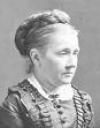Julia Ward Howe 1819 - 1910
November 23, 2007
 Julia Ward
Howe 1819 - 1910
supported
homeopathy
and regularly spoke out in their
favour.
Howe was a board
member
of Clemence
Lozier’s
homeopathic New York Medical College. Howe
spoke at the graduation
ceremony
of Lozier’s neice, homeopath Charlotte Denman
Lozier.
Julia Ward
Howe 1819 - 1910
supported
homeopathy
and regularly spoke out in their
favour.
Howe was a board
member
of Clemence
Lozier’s
homeopathic New York Medical College. Howe
spoke at the graduation
ceremony
of Lozier’s neice, homeopath Charlotte Denman
Lozier.
Ward Howe also spoke at the inaugural address for the homeopathic New England Female Medical College, having been a strong supporter of its founder Marie Zakrzewska. Ward Howe was one of the founders of the New England Women’s Club which supported this campaign.
Ward Howe was also a member of the Women’s Educational and Industrial Union of Boston with prominent homeopathic founders, Arvilla B Haynes and Mercy B Jackson.
Ward Howe was the editor of Sex and Education, containing contributions from Abbie Holmes Christensen and Mercy B Jackson. Ward Howe also supported homeopathic advocate Harriet Clisby, the founder member of WEIU. Her close friend Eliza Middleton Fisher was a strong advocate of homeopathy.
Ward Howe also appointed homeopath Julia Holmes Smith to the board of Woman’s Committee at the World’s Industrial and Cotton Centennial Exposition in New Orleans in 1884-85, and she was present at Seneca Falls when the National Woman Suffrage Association was set up, and she shared friendship and ideas with many homeopaths and homeopathic supporters, Susan B Anthony, Elizabeth Cady Stanton, Clemence Lozier, Lucretia Coffin Mott, Lucy Stone and many others.
Ward Howe was also a staunch abolitionist.
Ward Howe took the Water Cure, which included homeopathy, with Harriet Beecher Stowe in 1846, an occasion which became a ’national social experience’ for radicals and reformers. Ward Howe ’immortalised’ Stowe’s Battle Hymn of the Republic, which was published by the local Boston firm Ticknor, Reed, and Fields.
The Elmira Water Cure was extremely popular and enabled the mixing of all the new ideologies, homeopathy, new religious sentiments, feminism, abolitionism and new educational and medical thinking to flourish amongst all of the most influential people in America at this time, something the old American world hated! There are always people who are not ’the liberally inclined part of the community‘.
Ward Howe knew most of the radicals of the age and most of them were supporters of homeopathy, fueled by new religious ideology, including Swedenborgian philosophy espoused by Elder Henry James and his son William, himself a homeopath.
Boston became the home of several prominent advocates of homeopathy, including Ward Howe, Louisa May Alcott and Elizabeth Stuart Phelps. The Boston Guide Book clearly illustrates what a small world Boston was at this time and what an eclectic group of reformers resided there! This group included Louisa May Alcott, Sarah Orne Jewett, Elizabeth Cady Stanton and many others who all circulated through Elizabeth Peabody’s Foreign Library and Ticknor and Fields’ Parnassus Corner, including Wendell Phillips, Henry Ward Beecher, Susan B Anthony, Horace Mann, Josephine S Griffing, Theodore Dwight Weld and the Grimke Sisters, William Lloyd Garrison, Parker Pillsbury, Theodore Parker, Clemence Lozier, Charlotte Denman Lozier, Gerrit Smith, Wendell Phillips, Frederick Douglass, Julia Ward Howe, William Lloyd Garrison, Hamilton Wilcox, Emily Howard Jennings Stowe, Susan B Anthony, Clara Barton, Phoebe Ann (Coffin) Hanaford, Moncure Daniel Conway, Elizabeth Peabody, Margaret Fuller, William Ellery Channing, Ellery Channing, George and Sophia Ripley, Orestes Brownson, James Freeman Clarke, John Sullivan Dwight, Paulina Kellogg Wright Davis, Ednah Dow Cheney, the Bartlett’s, the Wesselhoefts, Thomas Wentworth Higginson, Gerrit Smith, Frederick Douglass, Hamilton Wilcox, Emily Howard Jennings Stowe, and Henry David Thoreau.
Ward Howe was a close friend of Marion Talbot, whose father Israel Tisdale Talbot was a homeopath and was the first dean of Boston University’s Medical School. She also befriended homeopathic supporter Harriet Hanson Robinson.
Ward Howe was a founder of the American Woman Suffrage Association along with Phoebe Hanaford who was married to homeopath Joseph Hanaford.
Ward Howe was a member of the ‘American Aristocracy’ with links to the Old World over several generations:
JOHN WARD MAILLIARD a Member of the American Ornithologists’ Union since 1901 and an Associate since 1895, died at his home in San Francisco, California, on January 9, 1935. He was born at Bordentown, New Jersey, on January 25, 1562, the youngest son of Adolphe and Ann Eliza Ward Mailliard. Both his father, and grandfather Louis Mailliard, were at various times secretaries to Joseph Bonaparte, the one-time ruler of Spain and brother of Napoleon I.
John Ward Mailliard’s mother was the granddaughter of Lieutenant-Colonel Sam Ward, of fame in the American Revolution. She was also a sister of Mrs. Julia Ward Howe, author the “Battle Hymn of the Republic,” and of John Ward, familiafly known as “Honest John Ward,” President of the New York Stock Exchange in 1530.
So it was of great import when such influential women spoke out for homeopathy and reforms, and for movements such as the American Mother’s Day which echoed Ward Howe’s Mother’s Day Proclamation in 1870.
Ward Howe’s influence flowed out long after her passage, for example when Tufts College campaigned to become coeducational Ward Howe rejoined the college and donated books and journals. The success of Tufts led to donations which established the Rhode Island Homeopathic Hospital in Providence.